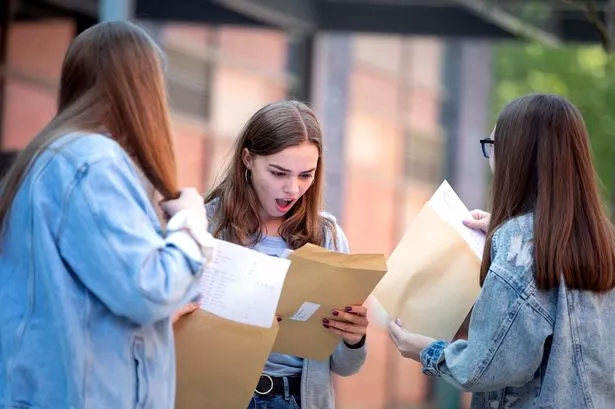Taking a GCSE resit can be a nerve-wracking experience. The pressure to improve your results and meet your academic goals can be overwhelming. But what happens if you end up doing worse in your resit?
GCSE resits are common for students who may not have achieved their desired grades the first time around. While the opportunity for a second chance can be beneficial, there is always the risk of not performing as well as hoped. This can lead to feelings of disappointment and uncertainty about future academic and career prospects.
It’s important to understand the potential consequences of not improving your GCSE results in a resit. From limited career opportunities to challenges in further education, failing to achieve the desired grades can have a significant impact on your future. In this article, we will explore the implications of doing worse in a GCSE resit and guide how to navigate this situation.
Table of contents
- Will Your Grade Go Down if You Do Worse on Your GCSE Resit?
- Can You Retake Your GCSEs Again?
- Why Will You Have to Retake Your GCSEs?
- How to Prepare for a GCSE Resit
- How Much Does it Cost to Resit GCSE Exams?
- What is a Functional Skills Qualification?
- Is it worth resitting GCSE exams?
- How Does Resitting Exams Affect Your Further Education?
- Can You Retake GCSEs While Working?
- Tips for retaking GCSEs while working
- What happens if you fail GCSE Maths?
Will Your Grade Go Down if You Do Worse on Your GCSE Resit?
No, your grade will not go down if you do worse on your GCSE resit. Your final grade will always be the highest grade you achieve, out of your original attempt and your resit.
This means that there is no risk in retaking your GCSEs, even if you have already passed them. If you get a worse grade in your resit, it will simply be ignored.
Related Post: When is the Student Finance Application Deadline in the UK?
Can You Retake Your GCSEs Again?
Yes, you can retake your GCSEs as many times as you like. There is no limit on the number of times you can take an exam, and you can retake different subjects at different times.
However, it is important to note that some schools and colleges may have restrictions on the number of times students can retake GCSEs. For example, some schools may only allow students to retake a GCSE once, while others may allow students to retake a GCSE multiple times.
It is also important to note that there is a cost associated with retaking GCSEs. This cost will vary depending on the school or college you are attending.
Why Will You Have to Retake Your GCSEs?
There are several reasons why you might choose to retake your GCSEs. Some of the most common reasons include:
- To improve your grades. If you are unhappy with the grades you achieved in your original GCSE exams, you can retake them to improve your grades. This can be beneficial for many reasons, such as improving your chances of getting into a good college or university or getting a better job.
- To take additional subjects. If you did not take all of the subjects you need for your further education or employment plans, you can retake GCSEs in those subjects. This is a good way to ensure that you have the qualifications you need to progress in your chosen field.
- To meet the requirements of a particular course or job. Some colleges, universities, and employers have specific GCSE requirements. If you do not meet these requirements, you may be able to retake your GCSEs to meet them.
How to Prepare for a GCSE Resit
If you are planning to retake your GCSEs, it is important to prepare carefully. Here are a few tips:
- Identify your areas of weakness. Once you have received your GCSE results, take some time to identify the areas where you need to improve. This will help you to focus your revision efforts.
- Create a revision plan. Once you know where you need to improve, create a revision plan that will help you cover all of the material. This plan should include specific goals and deadlines.
- Get help from others. If you are struggling with a particular topic, don’t be afraid to ask for help from your teachers, classmates, or parents. You can also find helpful resources online and in libraries.
- Take practice exams. Once you have finished revising, take some practice exams to test your knowledge and identify any areas where you still need to improve.
Related Post: How Long is Sixth Form in the UK? A Guide To Private Sixth Form In The UK
How Much Does it Cost to Resit GCSE Exams?
The cost of resitting a GCSE can vary depending on the exam board and the type of exam. On average, it can cost anywhere from £30 to £100 per exam subject. Some schools or colleges may offer to resit the exams for free, while others may charge a fee. It is best to check with the exam board or school for the most accurate information.
Here is a breakdown of the average cost of resitting GCSE exams with each of the major exam boards in England:
| Exam Board | Cost per GCSE |
| AQA | £120 |
| Edexcel | £115 |
| OCR | £110 |
What is a Functional Skills Qualification?
Functional Skills Qualifications are designed to help learners develop the essential skills they need for everyday life and work. They are available in English, Maths, and ICT.
Functional Skills Qualifications are assessed at Entry Level 1, Entry Level 2, Level 1, and Level 2. Each level is equivalent to a GCSE grade.
Functional Skills Qualifications can be taken on their own or as part of a wider qualification, such as a GCSE or BTEC.
The cost of taking a Functional Skills Qualification varies depending on the provider and the level of the qualification. On average, it can cost anywhere from £100 to £300 per qualification.
Is it worth resitting GCSE exams?
Whether or not it is worth resitting GCSE exams depends on your individual circumstances. If you are considering resitting your GCSEs, you should ask yourself the following questions:
- Why did I not achieve the grades I wanted the first time?
- Am I prepared to put in the hard work required to improve my grades?
- How will resitting my GCSEs benefit me?
If you are unsure whether or not resitting your GCSEs is the right decision for you, you should speak to your school or college advisor.
Related Post: How Long Are A-Level Exams?
How Does Resitting Exams Affect Your Further Education?
Resitting exams can have a positive impact on your further education in a number of ways. It can:
- Improve your grades: If you retake an exam and get a better grade, this will improve your overall academic record. This can make you more competitive when applying to universities and colleges, and it can also help you achieve higher grades in your future studies.
- Open up new opportunities: If you have failed to achieve the grades you need to progress to your chosen course or university, resitting exams can give you a second chance. It can also open up new opportunities that you may not have previously considered.
- Demonstrate your commitment to learning: Resitting exams shows that you are willing to put in the extra work to improve your grades. This can be seen as a positive quality by universities and colleges, as it demonstrates your commitment to learning and your determination to succeed.
Of course, there are also some potential downsides to resitting exams. For example, it can be time-consuming and stressful. It is important to weigh up the pros and cons carefully before deciding whether or not to resit an exam.
Can You Retake GCSEs While Working?
Yes, it is possible to retake GCSEs while working. There are several different ways to do this, including:
- Evening classes: Many schools and colleges offer evening classes for adults who want to retake GCSEs. This is a good option if you have a full-time job, as it allows you to study in the evenings and on weekends.
- Distance learning: Many distance learning providers offer GCSE courses. This is a good option if you are unable to attend evening classes, or if you live in a rural area.
- Day release: Some employers may be willing to offer you a day release, which means that you can attend college or school one day per week during your working hours. This is a good option if you want to improve your grades while still earning a salary.
If you are considering retaking GCSEs while working, it is important to be realistic about the time and effort that will be required. You will need to be able to juggle your work commitments with your studies, and you will need to be disciplined enough to study regularly. However, if you are willing to put in the effort, it is possible to retake GCSEs successfully while working.
Tips for retaking GCSEs while working
Here are some tips for retaking GCSEs while working:
- Choose the right study method: Consider your work commitments and lifestyle when choosing how to study. If you have a lot of free time in the evenings, then evening classes may be a good option for you. If you have a more unpredictable schedule, then distance learning may be a better choice.
- Create a study plan: Once you have chosen a study method, create a realistic study plan. Schedule time to study each day, and stick to your plan as much as possible.
- Find a study buddy: Studying with a friend or classmate can help you to stay motivated and on track.
- Take breaks: It is important to take breaks when you are studying, especially if you are working full-time. Get up and move around every 20-30 minutes to avoid getting burned out.
- Ask for help if you need it: If you are struggling with a particular topic, don’t be afraid to ask for help from your teacher, tutor, or study buddy.
Retaking GCSEs while working can be challenging, but it is possible to succeed. By following these tips, you can increase your chances of success.
Related Post: What Time Do Primary Schools Start and Finish in the UK?
What happens if you fail GCSE Maths?
If you fail GCSE Maths, there are a few options available to you:
- You can retake the exam in November or the following summer.
- You can take a foundation maths course instead.
- You can leave school without a maths qualification, but this may limit your future options.
If you decide to retake the exam, you will need to start revising straight away. You can do this independently, with the help of a tutor, or by taking a revision course.
Related Post: Do You Have to Pass English Literature? What’s Most Important in 2024
How to prepare for your GCSE Maths resit
Here are some tips on how to prepare for your GCSE Maths resit:
- Create a revision plan. Decide which topics you need to cover and how much time you need to spend on each one.
- Use past papers. Past questions are a great way to get used to the format of the exam and the types of questions that are asked.
- Get help from a tutor or teacher. If you are struggling with a particular topic, ask for help from a tutor or teacher.
- Form a study group. Studying with other people can help you to stay motivated and focused.
- Take breaks. It is important to take breaks while you are revising so that you do not get overwhelmed.
Here are some additional tips that may be helpful:
- Identify your weaknesses. Take a diagnostic test or look at your previous exam results to identify the areas where you need to improve.
- Focus on your weaknesses. Once you know your weaknesses, you can focus your revision on those areas.
- Use a variety of revision resources. There are many different revision resources available, such as textbooks, online resources, and revision guides. Use a variety of resources to keep your revision interesting and engaging.
- Practice regularly. The best way to prepare for an exam is to practice regularly. Try to do some maths practice every day, even if it is just for 30 minutes.
It is also important to remember that you are not alone. Many students resit GCSE Maths and go on to achieve good grades. With hard work and dedication, you can pass your GCSE Maths resit and achieve your goals.
Related Post: How To Write Fast In Exam: A Quick Guide To Write Faster During Exams
Conclusion
It is important to remember that a lower grade in a GCSE resit is not the end of the road. While it may be disappointing initially, there are still plenty of opportunities available for further education and career advancement.
Take this setback as a learning experience and use it to fuel your motivation for future success. Seek support from teachers, parents, or educational counselors to help you navigate your next steps.
Remember, your worth and potential are not defined by a single exam result; keep pushing forward and striving for your goals.
Frequently Asked Questions
Yes, you can keep resitting GCSE exams until you achieve the grades you need. However, there may be a cost associated with resitting exams.
If you fail a GCSE resit, you may be able to take the exam again in the next academic year. You may also be able to take a different qualification, such as a functional skills qualification.
If you are struggling to prepare for a GCSE resit, talk to your teacher. They can give you advice on how to prepare for the exam and identify any areas where you need extra support.




